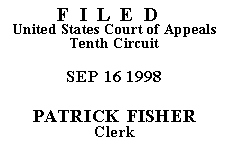

| UNITED STATES OF AMERICA; KIRK ALLINGER, Revenue Agent; INTERNAL REVENUE SERVICE, | |
| v. |
(D.C. No. 97-CV-1525) |
| IVAN G. CARNEY, |
Ivan G. Carney, appearing pro se,(1) appeals the district court's order enforcing an Internal Revenue Service ("IRS") summons. He contends that the district court erred in concluding that he was not entitled to invoke a blanket Fifth Amendment privilege against producing any of the "books, records and other data" requested in the summons. We exercise jurisdiction pursuant to 28 U.S.C. § 1291(2) and affirm.
BACKGROUND
The facts are undisputed. On August 22, 1997, IRS agent Kirk Allinger issued an administrative summons(3) to Carney, which required Carney to appear to give testimony and to bring with him certain books, papers, records, and other data relating to Carney's chiropractic clinics and rental properties for 1994 and 1995. When Carney failed to appear on the date specified in the summons, the government filed a petition in the United States District Court for the District of Kansas to enforce the summons. Carney's counsel filed an answer to the petition which stated that Carney "invokes his Fifth Amendment privilege against self-incrimination, and asserts that for him to disclose the information sought by the IRS would expose him to prosecution for a tax crime." Appellee's Br. at 4. The case was referred to a magistrate judge, who recommended that the summons be enforced. R. Vol. I, Tab 9. On the same day, the district court adopted the magistrate judge's recommendation. Id., Tab 10. Carney then filed objections to the magistrate judge's recommendation, and he also filed a motion for reconsideration. Id., Tabs 11, 12. In those filings, Carney did not contest any of the court's factual findings, but rather he asserted errors in legal interpretation respecting his claim of a Fifth Amendment privilege against self incrimination, and he complained that the government was engaged in a "fishing expedition." On April 7, 1998, the district court specifically rejected Carney's blanket Fifth Amendment claim and denied his motion for reconsideration. Id., Tab 16.
DISCUSSION
We review the district court's order enforcing the IRS summons for clear error. United States v. Coopers & Lybrand, 550 F.2d 615, 620 (10th Cir. 1977); see also United States v. Saunders, 951 F.2d 1065, 1066 (9th Cir. 1991). As noted, Carney did not object to the magistrate judge's factual findings which the district court adopted regarding the government's prima facie showing below. Therefore, although he advances certain arguments on appeal related to whether the government followed the appropriate administrative steps, we deem those arguments waived. Walker v. Mather (In re Walker), 959 F.2d 894, 896 (10th Cir. 1992). Thus, the only point which Carney has properly preserved for our consideration is whether, and to what extent, he is entitled to invoke a Fifth Amendment right against self-incrimination.
In a very similar case involving an IRS administrative summons, we held that a taxpayer may not claim a Fifth Amendment privilege against self incrimination through a generalized, blanket assertion. United States v. Schmidt, 816 F.2d 1477, 1482 (10th Cir. 1987); accord United States v. Argomaniz, 925 F.2d 1349, 1353 n.8, 1356 (11th Cir. 1991). Rather, to properly invoke the privilege, the taxpayer must comply with the summons by appearing and by asserting the privilege on a document-by-document basis. Schmidt, 816 F.2d at 1482. Moreover, assertion of the privilege is personal to the taxpayer and may not be properly invoked by taxpayer's counsel. Id. at 1481 n.3. Accordingly, we conclude that the district court properly rejected Carney's blanket assertion of his
Fifth Amendment privilege.
AFFIRMED.
ENTERED FOR THE COURT
Stephen H. Anderson
Circuit Judge
*.This order and judgment is not binding precedent, except under the doctrines of law of the case, res judicata, and collateral estoppel. The court generally disfavors the citation of orders and judgments; nevertheless, an order and judgment may be cited under the terms and conditions of 10th Cir. R. 36.3.
1.Carney was represented by counsel in all substantive filings in the district court. However, Carney's counsel withdrew prior to the contempt hearing which was scheduled pursuant to the court's ruling on the merits of the government's petition, and Carney has since represented himself. Appellant's Br. at 2.
2.See United States v. Jose, 519 U.S. 54, 57, 117 S. Ct. 463, 465 (1996) (noting that an order enforcing an IRS summons is final and appealable).
3.Although both parties refer repeatedly to the summons, neither it, nor the government's petition, nor Carney's answer, has been transmitted as part of the record on appeal. Inasmuch as both parties rely on these documents in their arguments, we have sua sponte supplemented the record on appeal to correct the parties' apparent oversight in record designation. See Cox v. United States, 881 F.2d 893, 894 n.1 (10th Cir. 1989); see also Fed. R. App. P. 10(e).